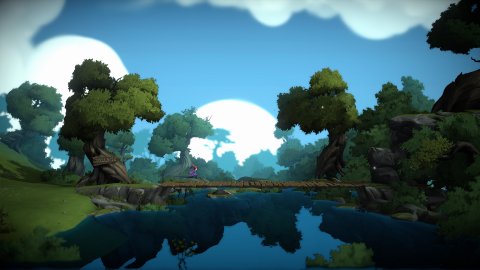Lost Words: Beyond the Page, the tried and true of an exciting platform adventure

Lost Words: Beyond the Page | Once upon a time ...
The adventure of Lost Words: Beyond the Page is entirely set, as in reality it is easy to understand from the title alone, between the pages of a diary. A young girl, Izzy, receives it as a gift from her grandmother, a member of the family she is most attached to. Her grandmother encourages her to write and always be curious and Izzy then begins to tell about her days and realizes she wants to be a writer.She will begin to imagine an entire fantasy world, Estoria, creating her own alter ego, whose name and appearance we can define on the basis of a few choices. Izzy is the writer of this story, but in part we become too while remaining spectators at the same time.
Estoria is a magical realm in which Izzy's alter ego trains to become a Guardian of the fireflies, or the protectors of the tree village where Izzy and her old teacher live. However, a monster attacks the village and, amidst the flames, the girl realizes that the magical creatures have disappeared: she decides to go in search of them.
Platforms and puzzles
Including the narrative incipit, we still have to answer a fundamental question: what game are we talking about? Lost Words: Beyond the Page is a platform and puzzle game. The whole adventure, as far as I saw in the demo, is divided into two types of sequences, which represent the two narrative levels of the story.Lost Words: Beyond the Page tells us the story of Estoria, but at the same time that of Izzy. In fact, the girl exploits the imaginary world to escape from the real one, in a continuous back and forth. All this is also reflected in the gameplay and graphics.
When Izzy talks to us, she is literally writing in the diary and we can see the words appear on the pages: the sentences then become platforms and, by controlling a stylized version of the girl, we will have to jump from one word to another until we reach the exit. However, it is not a linear and passive experience, but on the contrary it is extremely interactive.
Some words are colorful and, by reaching them, we activate new phrases / platforms (all dubbed): it is a great way to give rhythm to the narrative and make sure that the player does not risk missing part of the speech in case he misses a jump. A note for the less experienced: the level of difficulty is practically nil, but in any case there are no limits of lives and a fall results in an instant respawn.
In addition, some words are movable and can be placed freely to create platforms and reach collectibles or continue to the exit. Izzy is also an excellent designer and in the more elaborate sequences she will add interactive images: for example, we can move a watering can to grow a seed and transform it into a plant that will transport us to a platform otherwise positioned too high.
These sequences, even if at first glance they seem extremely limited and simple, are actually refined and satisfying. The quality of writing, as seen in the demo of Lost Words: Beyond the Page, however, remains the main strength of this adventure: it also does not hurt the dubbing that adds emotion, rhythm and depth to each sentence.
All this, however, is only part of the adventure. Izzy, between confessions and diary phases, will continue her journey in Estoria, which features its own cel-shaded graphic style and dedicated gameplay.
Leave the pages of the diary, the Izzy's alter ego finds himself in a real world with 3D graphics (but the exploration remains 2D). Also in this case the words play a fundamental role, the young woman is in fact a sorceress and thanks to her book she can discover and memorize various magic words to recall to complete some sections. We will have to repair objects, lift others to clear the passage or even extinguish the flames.
Lost Word: Beyond the Page is an extremely promising platforming adventure. The double structure, which blends sections in the diary and sequences in Estoria, promises a good variety both playful and narrative. Through the demo it is impossible to understand, however, if the "puzzles" will be simple and linear as in the early stages. The level of difficulty is certainly set downwards, but we hope that overall it will be able to test the player with new interactions that are not obvious. The graphic style is sweet and fabulous and the dubbing, along with the soundtrack, looks promising. We will be able to confirm the good impressions by testing a full version, but for the moment we cannot but suggest you to try this demo available on Steam.